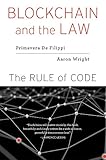Blockchain and the law : the rule of code / Primavera De Filippi and Aaron Wright.
Material type: TextPublication details: Cambridge, Massachusetts : Harvard University Press, (c)2018.Description: 1 online resource (300 pages)Content type:
TextPublication details: Cambridge, Massachusetts : Harvard University Press, (c)2018.Description: 1 online resource (300 pages)Content type: - text
- computer
- online resource
- 9780674985933
- QA76 .B563 2018
- COPYRIGHT NOT covered - Click this link to request copyright permission: https://lib.ciu.edu/copyright-request-form
| Item type | Current library | Collection | Call number | URL | Status | Date due | Barcode | |
|---|---|---|---|---|---|---|---|---|
 Online Book (LOGIN USING YOUR MY CIU LOGIN AND PASSWORD)
Online Book (LOGIN USING YOUR MY CIU LOGIN AND PASSWORD)
|
G. Allen Fleece Library ONLINE | Non-fiction | QA76.9.32 (Browse shelf(Opens below)) | Link to resource | Available | on1030578622 |
Blockchain technology enables the creation of decentralized currencies, decentralized applications powered by smart contracts, self-executing digital agreements, and intelligent assets that can be controlled over the Internet. Blockchains also enable the development of new governance systems with more democratic or participatory decision-making, and decentralized (autonomous) organizations that can operate over a network of computers without any human intervention. These applications have led many to compare the blockchain to the Internet, with accompanying predictions that this technology will shift the balance of power away from centralized authorities in the field of communications, business, and even politics or law. Blockchain and the Law explores the benefits and drawbacks of this emerging decentralized technology and argues that its widespread deployment will lead to expansion of what we term lex cryptographia: rules administered through self-executing smart contracts.--
Includes bibliographies and index.
Part I. The technology: Blockchains, bitcoin, and decentralized computing platforms -- Characteristics of blockchains -- Part II. Blockchains, finance, and contracts: Digital currencies and decentralized payment systems -- Smart contracts as legal contracts -- Smart securities and derivatives -- Part III. Blockchains and information systems: Tamper-resistant, certified, and authenticated data -- Resilient and tamper-resistant information systems -- Part IV. Organizations and automation: The future of organizations -- Decentralized autonomous organizations -- Blockchain of things -- Part V. Regulating decentralized, blockchain-based systems: Modes of regulation -- Code as law.
COPYRIGHT NOT covered - Click this link to request copyright permission:
There are no comments on this title.
